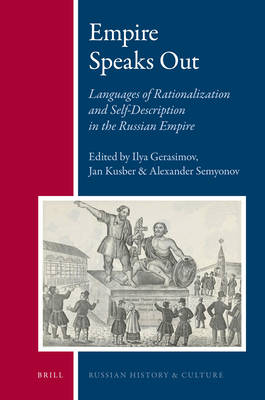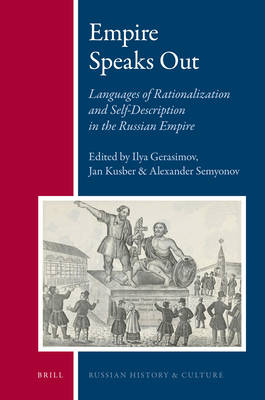
- Afhalen na 1 uur in een winkel met voorraad
- Gratis thuislevering in België vanaf € 30
- Ruim aanbod met 7 miljoen producten
- Afhalen na 1 uur in een winkel met voorraad
- Gratis thuislevering in België vanaf € 30
- Ruim aanbod met 7 miljoen producten
Zoeken
Empire Speaks Out
Languages of Rationalization and Self-Description in the Russian Empire
Ilya Gerasimov, Jan Kusber, Alexander Semyonov
€ 296,45
+ 592 punten
Omschrijving
Historians habitually write about empires that expand, wage wars, and collapse, as if empires were self-evident and self-conscious entities with a distinct and clear sense of purpose. The stories of empires are told in the language of modern nation-centred social sciences: multi-cultural and heterogeneous empires of the past appear either as huge "nations" with a common language, culture, and territory, or as amalgamations of would-be nations striving to gain independence. Empire Speaks Out reconstructs the historical encounter of the Russian Empire of the seventeenth through the early twentieth centuries with the complex challenge of modernity. It does so by taking the self-awareness of empire seriously, and by looking into how bureaucrats, ideologues, politicians, scholars, and modern professionals described the ethnic, cultural, and social diversity of the empire. "Empire" then reveals itself not through deliberate and well-conceived actions of some mysterious political body, but as a series of "imperial situations" that different people encounter and perceive in common categories. The rationalization of previously intuitive social practices as imperial languages is the central theme of the collection.
This book is published with support from Volkswagen Foundation, within the collective research project "Languages of Self Description and Representation in the Russian Empire"
This book is published with support from Volkswagen Foundation, within the collective research project "Languages of Self Description and Representation in the Russian Empire"
Specificaties
Betrokkenen
- Auteur(s):
- Uitgeverij:
Inhoud
- Aantal bladzijden:
- 288
- Taal:
- Engels
- Reeks:
- Reeksnummer:
- nr. 1
Eigenschappen
- Productcode (EAN):
- 9789004175716
- Verschijningsdatum:
- 2/06/2009
- Uitvoering:
- Hardcover
- Formaat:
- Ongenaaid / garenloos gebonden
- Afmetingen:
- 165 mm x 246 mm
- Gewicht:
- 612 g

Alleen bij Standaard Boekhandel
+ 592 punten op je klantenkaart van Standaard Boekhandel
Beoordelingen
We publiceren alleen reviews die voldoen aan de voorwaarden voor reviews. Bekijk onze voorwaarden voor reviews.








